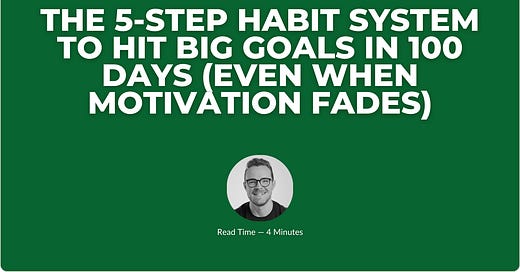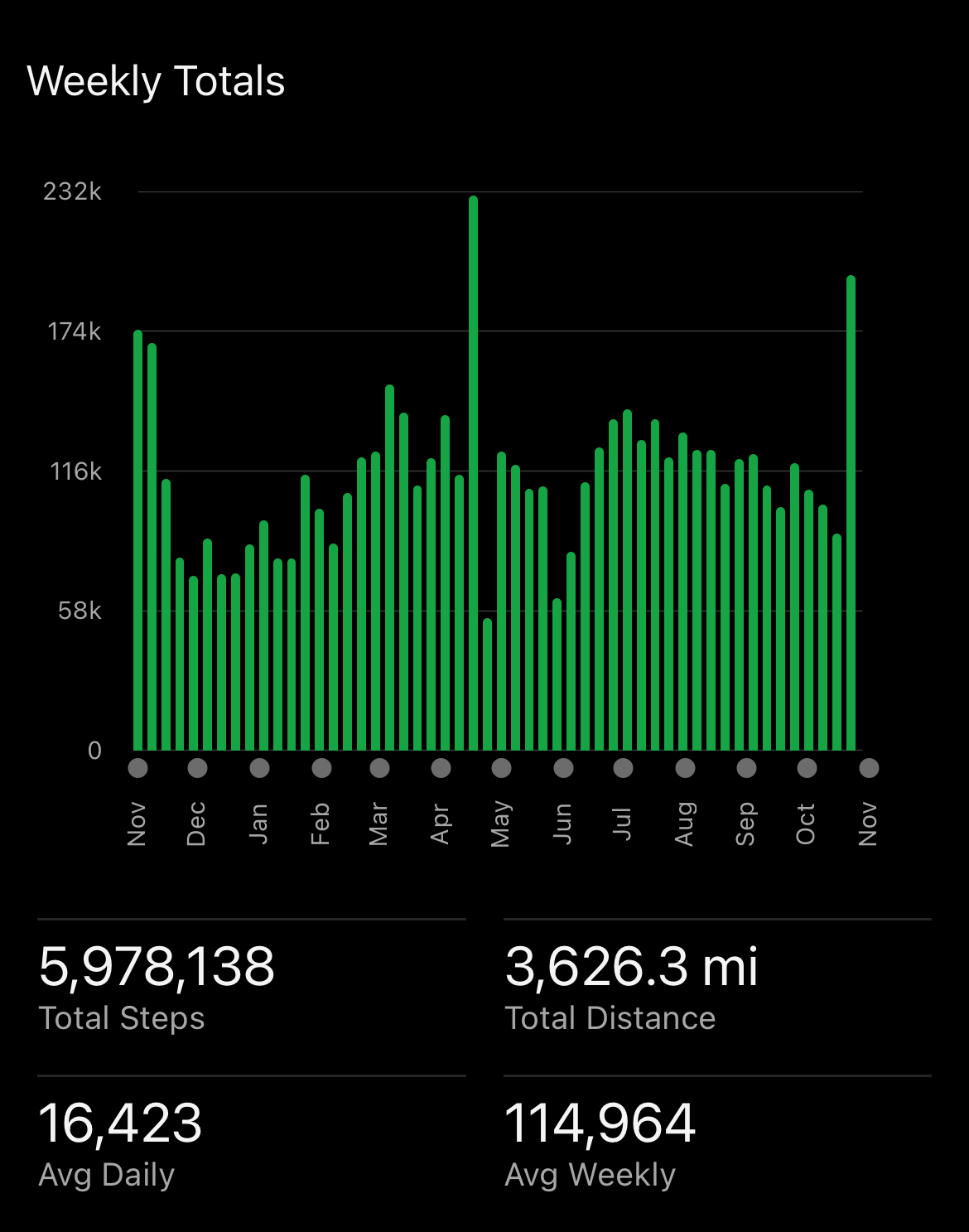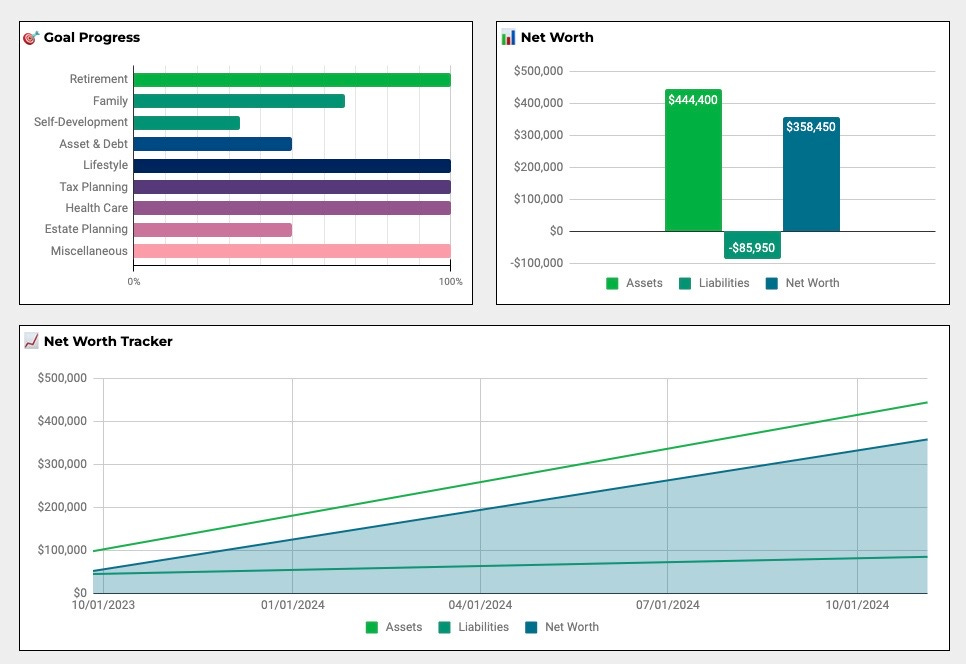The 5-Step Habit System to Hit Big Goals in 100 Days (Even When Motivation Fades)
As we approach the end of the year - here's how to ensure your goals don't just stay goals in 2025.
Every New Year, the same story plays out:
Resolutions are set. Big goals are planned. Motivation peaks…then fades.
Here’s the thing: Falling short on big goals isn’t a failure — it’s a natural outcome of an unsustainable approach. Most people jump in full force, only to burn out before they even see progress.
One of the most important things I’ve learned over the years is to form a habit-based framework. I’ve combined systems from people like Ben Meer and James Clear to achieve personal, physical and financial goals, and here’s the thing: The key isn’t massive action; it’s small, consistent steps.
Let me show you how to approach big goals with small, daily habits that actually stick.
1. Start with Small, Strategic Habits Aligned with Big Goals
Most people try to overhaul their lives in one go, but this is a surefire path to burnout.
Small, specific habits build momentum. Focusing on just 3-5 essential actions each day is like planting seeds that grow over time, transforming your efforts into lasting results.
In practice, here’s what this could look like:
Goal: Improve your physical fitness. Habit: Walk for just 20 minutes each day.
Goal: Get a grip on Cash Flow. Habit: Log Into Bank Account Every Morning to acknowledge what was spent the day before.
Goal: Build Better Relationships. Habit: Call One Person a Day to Catch Up.
These aren’t grand gestures; they’re small, repeatable actions. Missing this step keeps your goal vague, making it easy to lose steam. Instead, give your habits specificity and meaning, and watch your motivation take root.
Quick Example Side Story: Earlier this year my “Misogi” - or year defining event, was a 100 mile endurance run back in April 2024. I summarized it HERE if you are interested.
Once I finished this and wrote about it online - all the comments came in. “Ah - you’re crazy!” “I could never do that”, all kinds of stuff like that. Wrong. The first time I ran was in June of 2016. Just finished my career as a football player, was 260 lbs, and wanted to get in shape. That day, I got on the treadmill - and quit after 0.75 miles because I was so out of shape & upset with myself.
The next day - I came back, and again, and again, and again, and within 7 years I ran a 24 hour 100 mile endurance race. Small, daily actions compound. Plant the seed!
2. Use a Simple Tracking System
Want to know the difference between those who stick to their goals and those who don’t? They track their progress.
Set up a simple tracker—a notebook, app, or even a grid on your fridge—to record each habit you complete. This doesn’t just keep you accountable; it reinforces your progress visually. Each checkmark is a micro-celebration of consistency.
For fitness, I’ve always used either an Apple Watch or Garmin App. I’ve always loved the ability to set even just a “Daily Step Goal” and hold myself accountable to doing that every day.
A year ago I told myself I was going to stick to 15,000 per day - without the daily tracking, there is little chance I’d have even come close. Life gets in the way, let the tools around you ensure you don’t forget about your commitments to your goals.
Financially - I’ve always been fortunate to work as a financial planner, and hence all of the fantastic software we have. However - even before that, I was always avidly tracking Net Worth, and Spending in a spreadsheet to hold myself accountable in making progress on my goals.
For our private clients, obviously we do all of this for you. For those who have access to the Opulus Method Course you know all about our master spreadsheet that includes all of the important tracking measures.
Resist the urge to jump ahead—tracking is the foundation of long-term momentum.
Create a habit-tracking table or grid.
Put it somewhere you’ll see it daily (on your desk, fridge, computer or phone home screen).
By recording daily actions, you build a powerful feedback loop that keeps motivation alive.
3. Accountability Partners & Reflection
Consistency is key, but regular reflection keeps you on track and adaptable. Every few weeks, check in and assess your progress.
Even better - have an accountability partner. I absolutely LOVE this concept and use its with everything I do. Tell someone your goals, check in regularly, and make sure they hold you accountable to doing the things you say you are going to do. For many, Opulus is your accountability partner when it comes to your finances!
Nobody wants to be the person who can’t follow through on what they say they’re going to do.
Additionally, when reflecting; Set aside time to answer these questions:
Am I sticking to my habits consistently?
Are these habits still aligned with my big goals?
Do I need to make adjustments to see better results?
Have I hit any unexpected obstacles? If so, why?
When am I most consistent?
What could make following these habits even easier?
Taking a few minutes to reflect lets you spot areas for improvement. Adjusting small actions based on these insights means you’ll stay on track rather than veering off course.
4. Celebrate Small Wins Along the Way
Most people forget to celebrate progress, but it’s critical for long-term success.
Now, by this point, your tracker is filled with proof of your consistency. Every day that you see progress is a small win worth celebrating. Research shows that celebrating these moments reinforces positive behavior, keeping you motivated to keep going.
For example, if your goal is financial, celebrate each week you follow your budgeting habit. Acknowledge each effort—it doesn’t have to be a huge celebration, just a small pat on the back, or treating yourself with some of the funds you’ve allocated towards your “lifestyles & luxuries” if you’re doing a good job following the 50/20/30 we always preach!
By making a habit of celebration, you’ll train yourself to value progress over perfection. Hint: Perfection is never coming.
5. Level-Up & Adjust
This is where it all comes together.
Once you’ve consistently followed these steps, take time to reflect on your results. Think of this as a checkpoint to decide what’s next. Do you want to add new habits? Increase the challenge? Tweak your current routine?
This reflection is your opportunity to adjust based on what’s actually working. You’ve built a foundation, and now it’s time to refine and build on that progress.
You’ve increased your baseline, become a better version of yourself, and now its time to continue to level-up.
Bottom Line
Big goals don’t require massive action—they require small, daily wins that build over time.
Recap:
Identify small, specific habits aligned with big goals.
Use a Simple Tracking System
Find an Accountability Partner.
Celebrate small wins to build resilience.
Level-Up and adjust as needed to keep growing.
You’re building something bigger than any individual action. Remember, it’s not about going fast; it’s about going far.
Here’s to playing the long game and crushing your biggest goals in 2025. Don’t wait until January. 100 days starts NOW!
Thanks for reading. See you next week.
Whenever you're ready, there are 2 other ways we can help you:
Opulus Method Digital Course: Join 350+ students inside the Opulus Method. In just 90 minutes, learn a proven system to secure your financial freedom without sacrificing your lifestyle.
Join Opulus as a Client: We'll build your personalized strategy to reduce taxes, boost your income, and grow your wealth. Live life on your terms—we'll execute the financial strategy to get you there.
Opulus, LLC (“Opulus”) is a registered investment advisor in Pennsylvania and other jurisdictions where exempted. Registration as an investment advisor does not imply any specific level of skill or training.
The content of this newsletter is for informational purposes only and does not constitute financial, tax, legal, or accounting advice. It is not an offer or solicitation to buy or sell any securities or investments, nor does it endorse any specific company, security, or investment strategy. Readers should not rely on this content as the sole basis for any investment or financial decisions.
Past performance is not indicative of future results. Investing involves risks, including the potential loss of principal. There is no guarantee that any investment strategies discussed will result in profits or avoid losses.
All information is provided "as-is" without any warranties, express or implied. Opulus does not warrant the accuracy, completeness, or reliability of the information presented. Opinions expressed are those of the authors, Ryan Greiser and Francis Walsh, and are subject to change without notice.
Opulus is not responsible for any errors or omissions, nor for any direct, indirect, or consequential damages resulting from the use or reliance on this information. Use of the content is at your own risk. This content is not intended as an offer or solicitation in any jurisdiction where such an offer or solicitation would be illegal.







